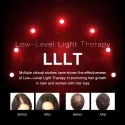2023-05-04
Alopecia is not only a physical condition but can also have a significant impact on an individual's psychological well-being. Hair loss can be a distressing experience that can affect a person's self-esteem, confidence, and overall quality of life. In this article, we will explore the psychological effects of alopecia and provide coping strategies for those who are experiencing hair loss.
Psychological Effects of Alopecia
Hair loss can have a significant impact on an individual's psychological well-being. Some of the common psychological effects of alopecia include:
Decreased Self-Esteem: Hair loss can affect an individual's self-esteem, leading to feelings of inadequacy and low self-worth.
Anxiety: Hair loss can cause anxiety in individuals, particularly in social situations. Fear of judgment or ridicule from others can lead to social isolation.
Depression: Hair loss can also cause depression in individuals, leading to feelings of sadness, hopelessness, and lack of interest in daily activities.
Body Image Issues: Hair loss can affect an individual's perception of their body image, leading to negative feelings about their appearance.
Coping Strategies for Hair Loss
There are several coping strategies that individuals with alopecia can use to manage the psychological effects of hair loss. Some of these strategies include:
Support Groups: Joining a support group for individuals with alopecia can provide a sense of community and connection with others who are going through a similar experience.
Counseling: Seeking professional counseling can help individuals to work through their feelings about hair loss and develop coping strategies.
Positive Self-Talk: Practicing positive self-talk can help individuals to improve their self-esteem and combat negative thoughts about their appearance.
Wigs and Hairpieces: Wearing wigs or hairpieces can provide a sense of normalcy and help individuals to feel more confident in social situations.
Self-Care: Engaging in self-care activities such as exercise, meditation, and healthy eating can improve overall well-being and help individuals to manage stress and anxiety.
Conclusion
Hair loss can have a significant impact on an individual's psychological well-being. It is important for individuals with alopecia to address the psychological effects of hair loss and develop coping strategies to manage their feelings. Seeking support from others, practicing positive self-talk, and engaging in self-care activities can help individuals to improve their overall well-being and manage the impact of hair loss on their lives. With the right tools and support, individuals with alopecia can thrive and live full, happy lives.
Innovative Hair Trends: Exploring the Latest Styles and Techniques










